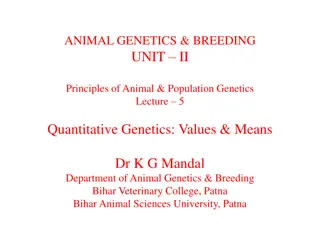
Standard Library Traits and Tags for C++ Developers
Dive into the world of standard library traits and tags in C++. Discover how iterator traits are used in container-manipulation functions, the types contained in std
Download Presentation

Please find below an Image/Link to download the presentation.
The content on the website is provided AS IS for your information and personal use only. It may not be sold, licensed, or shared on other websites without obtaining consent from the author. If you encounter any issues during the download, it is possible that the publisher has removed the file from their server.
You are allowed to download the files provided on this website for personal or commercial use, subject to the condition that they are used lawfully. All files are the property of their respective owners.
The content on the website is provided AS IS for your information and personal use only. It may not be sold, licensed, or shared on other websites without obtaining consent from the author.
E N D
Presentation Transcript
std::iterator_traits Container-manipulation functions usually use iterators in their interface Such functions need to know some properties of the underlying containers new versions of algorithms in std::ranges use concepts instead of std::iterator_traits If IT is an iterator type, std::iterator_traits<IT> contains the following types: difference_type a signed type large enough to hold distances between iterators usually std::ptrdiff_t value_type the type of an element pointed to by the iterator reference a type acting as a reference to an element this is the type actually returned by operator* of the iterator usually value_type& or const value_type& it may be a class simulating a reference (e.g. for vector<bool>) pointer a type acting as a pointer to an element value_type*, const value_type*, or a class simulating a pointer iterator_category one of predefined tags describing the category of the iterator std::input_iterator_tag, std::output_iterator_tag, std::forward_iterator_tag, std::bidirectional_iterator_tag, or std::random_access_iterator_tag shall be used via template specialization or using std::is_same_v
std::iterator_traits Implemented in standard library as template< typename IT> struct iterator_traits { using difference_type = typename IT::difference_type; using value_type = typename IT::value_type; using reference = typename IT::reference; using pointer = typename IT::pointer; using iterator_category = typename IT::iterator_category; }; Any class intended to act as an iterator shall define the five types referenced above All the five are required by the <algorithm> library For the <ranges> library, defining value_type and difference_type is sufficient The five types shall be accessed only indirectly through std::iterator_traits Since raw pointers may act as iterators, there is a partial specialization: template< typename T> struct iterator_traits<T*> { using difference_type = std::ptrdiff_t; using value_type = std::remove_cv_t<T>; using reference = T&; using pointer = T*; using iterator_category = std::random_access_iterator_tag; }; std::remove_cv_t<T> removes any const/volatile modifiers from T
std::remove_cv_t The implementation of std::remove_cv_t<T> Based on the traits template std::remove_cv<T> general template template< typename T> struct remove_cv { using type = T; }; partial specializations have higher priority if they match more precisely the actual argument template< typename T> struct remove_cv< const T> { using type = T; }; template< typename T> struct remove_cv< volatile T> { using type = T; }; template< typename T> struct remove_cv< const volatile T> { using type = T; }; The result is represented by a member named type by convention, used directly as: typename remove_cv<X>::type For convenience, the result may be accessed using the type alias: template< typename T> using remove_cv_t = typename remove_cv<T>::type; _t suffix convention is widely used in std library It can be used simply as: remove_cv_t<X>
volatile volatile Used to denote non-memory locations in address space (e.g. I/O ports) Compilers never eliminate or reorder accesses to volatile locations It is UNSUITABLE for communication between threads A read from a volatile variable that is modified by another thread without synchronization or concurrent modification from two unsynchronized threads is undefined behavior due to a data race. Use std::atomic<T> instead Unless you program device drivers or embedded systems, you shall not use volatile Nevertheless, your templates shall work even for volatile types Always use std::remove_cv_t instead of std::remove_const_t
decltype() and std::remove_reference_t Technically, std::iterator_traits are no longer needed It is still usually simpler to use them Replacing std::iterator_traits with decltype() template< typename IT> auto range_max(IT b, IT e) { using T = std::remove_cv_t<std::remove_reference_t<decltype(*b)>>; T m = std::numeric_limits<T>::lowest(); for (; b != e; ++b) m = std::max(m, *b); return m; } decltype(E) denotes the type of the expression E More exactly: The return type declared for the outermost function invoked in E This is the (compile-time) static type, see typeid for the (run-time) dynamic type In the example, decltype(*b) denotes the return type of IT::operator* This is usually T& or const T& decltype(E) must usually be used with remove_reference_t and remove_cv_t const T& -> remove_reference_t -> const T -> remove_cv_t -> T [C++20] remove_cvref_t<X> = remove_cv_t< remove_reference_t<X>>
decltype() and std::declval We use the ability of the compiler to infer the return type from the body template< typename IT> auto range_max(IT b, IT e) { using T = std::remove_cv_t<std::remove_reference_t<decltype(*b)>>; T m = std::numeric_limits<T>::lowest(); for (; b != e; ++b) m = std::max(m, *b); return m; } What if we wanted to specify the return type explicitly? e.g., in a standalone declaration Using the auto f() -> T syntax, we can reference the argument names template< typename IT> auto range_max(IT b, IT e) -> std::remove_cv_t<std::remove_reference_t<decltype(*b)>>; Otherwise, we need std::declval<T>() It creates an expression of type T from nothing (by casting nullptr to T*) template< typename IT> std::remove_cv_t<std::remove_reference_t<decltype(*std::declval<IT>())>> range_max(IT b, IT e); std::declval is a library template function while decltype is a keyword
std::is_reference_v Traits returning constants, e.g. std::is_reference_v<T> Based on the traits template std::is_reference<T> general template template< typename T> struct is_reference<T> : std::false_type {}; partial specializations have higher priority template< typename T> struct is_reference<T&> : std::true_type {}; template< typename T> struct is_reference<T&&> : std::true_type {}; Uses two type aliases (logically acting as policy classes): using false_type = std::integral_constant<bool, false>; using true_type = std::integral_constant<bool, true>; These are aliases of a particular case of a more general auxiliary class: template< typename U, U v> struct integral_constant { static constexpr U value = v; // ... there are more members here ... explanation later }; The result is represented by a static constexpr member named value by convention For convenience, the result may be accessed using the global variable alias: template< typename T> inline constexpr is_reference_v = is_reference<T>::value;
std::is_reference_v Use of (Boolean) constants in templates important examples: template< typename T> class example { static constexpr bool is_ref = std::is_reference_v< T>; passing a constant to another template type (possibly specialized) using another_type = some_template< is_ref>; std::conditional_t is a compile-time conditional expression acting on types: using my_type = std::conditional_t< is_ref, std::add_pointer_t< std::remove_reference_t< T>>, T>; // replace reference by pointer void a_method() { constexpr if no runtime cost; the inactive branch is not semantically checked if constexpr (is_ref) { /*...*/ } else { /*...*/ } passing a constant to a template function some_function< is_ref>(); passing a type representing a constant to a function via a runtime argument it creates an object from the traits class (it shall no longer be called traits in this case) using is_ref_t = std::is_reference<T>; another_function( is_ref_t{}); } };
Value-less function arguments passing a type representing a constant to a function via a runtime argument using is_ref_t = std::is_reference<T>; another_function( is_ref_t{}); an empty object is created from the traits class no run-time value is passed through the argument (compilers usually produce no code for it) the argument is used to pass compile-time information, i.e. its type the function may be overloaded on the type in the case of std::is_reference<T>, inheritance hierarchy also applies (this is slicing!) void another_function( std::false_type) { /*...*/ } void another_function( std::true_type) { /*...*/ } alternatively, the function may be a template template< bool v> void another_function( std::integral_constant< bool, v>) { if constexpr (v) { /*...*/ } else { /*...*/ } } Trick: std::integral_constant<T,v> also defines conversion operator to T returning v template< typename X> void another_function( X a) { if constexpr (a) { /*...*/ } else { /*...*/ } } This allows defining the function as lambda: auto another_function = [](auto a) { if constexpr (a) { /*...*/ } else { /*...*/ }; };
Tag arguments Distinguishing constructors Another use-case for value-less function arguments All constructors have the same name the name cannot be used to specify the required behavior Example: std::optional<T> can store T or nothing using string_opt = std::optional< std::string>; string_opt x; // initialized as nothing assert(!x.has_value()); string_opt y(std::in_place); // initialized as std::string() assert(y.has_value() && (*y).empty()); string_opt z(std::in_place, Hello ); // initialized as std::string( Hello ) assert(z.has_value() && *z == Hello ); Implementation: struct in_place_t {}; // a tag class inline constexpr in_place_t in_place; // an empty variable of tag type template< typename T> class optional { public: optional(); // initialize as nothing template< typename... L> optional( in_place_t, L &&... l); // initialize by constructing T from the arguments l };
Tag arguments The same approach is also used for regular functions The purpose is to have the same name for different implementations of the same functionality Example: std::for_each allows to select parallel execution: std::for_each( std::execution::par, k.begin(), k.end(), [](auto && a){ ++a; }); std::execution::par is a global variable of type std::execution::parallel_policy The parallel implementation of for_each: template< typename IT, typename F> void for_each( std::execution::parallel_policy, IT b, IT e, F f);
Tag arguments with parameters A tag class may carry a compile-time value Example: The initialization of std::variant<T1,...,Tn> using my_variant = std::variant< std::string, const char *>; my_variant x( in_place_index<0>, Hello ); // initialized as std::string( Hello ) assert(x.index() == 0 && std::get<0>(x) == Hello ); my_variant y( in_place_index<1>, Hello ); // initialized as (const char *)( Hello ) assert(y.index() == 1 && !strcmp(std::get<1>(y), Hello )); Implementation: template<std::size_t> struct in_place_index_t {}; // a tag class template template<std::size_t I> inline constexpr in_place_index_t<I> in_place_index; // an empty variable of tag type template< typename... TL> class variant { public: template< std::size_t I, typename... L> variant( in_place_index_t<I>, L &&... l); /*...*/ };
Employing type non-equivalence with tag classes Type non-equivalence template< typename P> Two classes/structs/unions/enums are always considered different class Value { even if they have the same contents double v; Two instances of the same template are considered different if their parameters are different // ... }; It also works with empty classes struct mass {}; Called tag classes struct energy {}; Usage: To distinguish types which represent different things using the same implementation Value< mass> m; Value< energy> e; Physical units Indexes to different arrays e = m; // error Similar effect to enum class






















